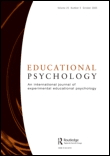
Educational Psychology
Scope & Guideline
Bridging theory and practice in educational psychology.
Introduction
Aims and Scopes
- Psychological Factors in Learning:
The journal investigates how various psychological constructs, such as motivation, self-efficacy, and emotional regulation, influence students' learning processes and educational outcomes. - Teacher-Student Relationships:
A significant focus is placed on the dynamics of teacher-student interactions, examining how these relationships affect student engagement, motivation, and academic achievement. - Impact of Contextual Factors:
The journal explores how contextual elements, including classroom environments, cultural backgrounds, and socio-economic factors, shape educational experiences and learning outcomes. - Diverse Learning Strategies:
Research includes the examination of various instructional methods and learning strategies, assessing their effectiveness across different educational settings and populations. - Inclusive Education Practices:
The journal emphasizes the importance of inclusive education, investigating strategies for supporting diverse learners and addressing the needs of students with varying abilities. - Educational Interventions and Assessments:
It also focuses on the design and evaluation of educational interventions, aiming to understand their impact on student learning and psychological well-being.
Trending and Emerging
- Emotional and Psychological Well-Being:
Recent publications emphasize the importance of emotional and psychological well-being in educational contexts, exploring how mental health impacts student engagement, motivation, and academic performance. - Technology-Enhanced Learning:
Research on the integration of technology in educational settings is gaining traction, particularly in how digital tools can enhance learning experiences and support self-regulated learning. - Diversity and Inclusion in Education:
There is an increasing focus on diversity and inclusion, addressing how educational practices can be adapted to meet the needs of all learners, especially those from marginalized backgrounds. - Mindfulness and Social-Emotional Learning:
Emerging themes include the role of mindfulness and social-emotional learning (SEL) in fostering resilience and improving academic outcomes, highlighting the importance of emotional regulation in education. - Motivation and Engagement Strategies:
Research is trending towards understanding motivational profiles and engagement strategies, examining how different motivational constructs influence student learning and achievement. - Longitudinal Studies on Learning Trajectories:
The journal is seeing a rise in longitudinal studies that track learning trajectories over time, providing insights into the development of academic skills and the impact of various interventions.
Declining or Waning
- Traditional Assessment Methods:
There is a noticeable decline in studies focusing on traditional assessment methods, such as standardized testing, as researchers increasingly explore alternative forms of assessment that emphasize formative feedback and holistic evaluations. - Behaviorist Approaches to Learning:
Research grounded in strict behaviorist frameworks appears to be waning, with a shift towards more constructivist and socio-constructivist approaches that consider learners' cognitive and emotional experiences. - Solely Cognitive Theories of Learning:
The emphasis on cognitive theories that neglect emotional and social dimensions of learning has decreased, as the field recognizes the importance of holistic approaches that integrate emotional and social factors. - Generalized Learning Theories:
There is a decline in interest in generalized learning theories that do not account for contextual variables, as recent studies increasingly focus on context-specific factors influencing educational practices.
Similar Journals
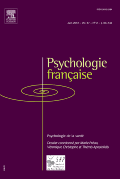
Psychologie Francaise
Connecting Scholars Through Groundbreaking ResearchPsychologie Francaise, published by Elsevier France - Éditions Scientifiques Médicales Elsevier, is a prominent journal in the field of psychology, specifically categorized within the realm of miscellaneous psychology. With its ISSN 0033-2984, the journal has been disseminating valuable research since its inception, contributing significantly to the academic discourse on psychological theories and practices. Although currently positioned in the Q4 category according to the 2023 quartile rankings, and with a Scopus rank of #179 out of 216 in the broader field of General Psychology, it serves as a crucial platform for emerging scholars and seasoned professionals alike to share innovative findings and insights that push the boundaries of psychological research. The journal operates from its base in Issy-les-Moulineaux, France, and has a commitment to fostering an inclusive dialogue around psychological science, despite its lack of open-access provisions. Over the years, Psychologie Francaise has continued to evolve, with a convergence period set to last through 2024, promising ongoing relevance and growth in one of the most profound and impactful fields of study.

Psicologia Educativa
Transforming Education with Psychological ExpertisePsicologia Educativa is a renowned academic journal dedicated to the field of educational psychology, published by the COLEGIO OFICIAL PSICOLOGOS MADRID. Since its initiation in 1995, this open access journal has become a significant platform for researchers and practitioners who seek to advance the scientific understanding of psychological principles in educational settings. With an impressive impact factor and recognition within the academic community—ranking in the Q3 quartile for Developmental and Educational Psychology and Q2 for Social Psychology in 2023—Psicologia Educativa is well-positioned to publish influential research that informs educational practices. The journal's scope spans a variety of topics within educational psychology, facilitating critical dialogue and innovative approaches in the realm of social interaction and development learning processes. By providing wide access to scholarly articles, it serves as an essential resource for students, researchers, and education professionals eager to contribute to the ever-evolving field of psychology.

Electronic Journal of Research in Educational Psychology
Unlocking the Potential of Educational ResearchElectronic Journal of Research in Educational Psychology, published by UNIV ALMERIA, serves as a vital platform for advancing research in the fields of educational psychology and developmental psychology. With an ISSN of 1699-5880 and an E-ISSN of 1696-2095, this journal has been disseminating scholarly work since its inception in 2003, contributing to an expansive collection of research that highlights current trends, methodologies, and theoretical developments up to 2024. Though it currently holds a Q4 in Developmental and Educational Psychology and a Q3 in Education according to 2023 category quartiles, it is steadily increasing its visibility among the scholarly community, reflected in its Scopus rankings within the 33rd percentile in Social Sciences Education and 21st percentile in Developmental and Educational Psychology. This open-access journal not only enhances accessibility to quality research but also aims to bridge the gap between theory and practice in educational settings. By fostering an environment of collaboration and interdisciplinary dialogue, it stands as an essential resource for researchers, professionals, and students striving to enrich their understanding of educational psychology.
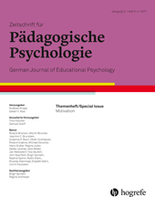
ZEITSCHRIFT FUR PADAGOGISCHE PSYCHOLOGIE
Fostering dialogue between developmental psychology and education.ZEITSCHRIFT FUR PADAGOGISCHE PSYCHOLOGIE, published by HOGREFE AG, is a vital resource in the field of Developmental and Educational Psychology, focusing on the interplay between psychological principles and educational practices. With an ISSN of 1010-0652 and an E-ISSN of 1664-2910, this esteemed journal has been at the forefront of academic dialogue since its inception in 1996 and continues to contribute significantly to the discipline through 2024. It holds a respectable Q3 ranking within its category, highlighted by its position in the 57th percentile among developmental and educational psychology journals in Scopus. Although it is not an Open Access journal, it remains highly regarded for its comprehensive coverage of empirical research, theoretical contributions, and practical implications relevant to educators and psychologists alike. This journal not only fosters the advancement of research but also provides actionable insights that inform effective educational strategies, making it an essential read for scholars, practitioners, and students eager to engage with the latest findings in pedagogical psychology.

Revista de Psicodidactica
Unveiling the Science of Learning and DevelopmentRevista de Psicodidactica, published by ELSEVIER ESPAÑA, is a leading academic journal dedicated to the fields of Developmental and Educational Psychology. With an impressive impact factor reflecting its high-quality research, the journal has achieved a commendable Q2 ranking in its field for Developmental and Educational Psychology and a Q1 ranking in Education as of 2023. Notably, it holds a significant position in Scopus Ranks, placing in the top 90th percentile in Social Sciences Education and the 84th percentile in Psychology. Launched in 2005, the journal is committed to advancing knowledge in educational practices through empirical research and theoretical frameworks. It provides a vital platform for researchers, educators, and students in Spain and beyond, fostering an open exchange of ideas and innovative approaches to learning and development. Though it is not an open-access publication, it remains a compelling source of contemporary findings for those invested in enhancing educational outcomes.

International Journal of Educational Psychology
Empowering Educators Through Research and CollaborationInternational Journal of Educational Psychology, published by HIPATIA PRESS, is a premier platform for innovative research in the fields of educational and developmental psychology. With an impact factor reflecting a growing presence in the academic community, this Open Access journal has been delivering peer-reviewed studies since its inception in 2012, facilitating worldwide accessibility and collaboration. Based in Barcelona, Spain, this journal focuses on advancing knowledge and practice in educational psychology, providing insights for educators, researchers, and practitioners alike. As it converges through the years from 2018 to 2024, the journal proudly holds a Q3 quartile ranking in both Developmental and Educational Psychology and Education categories, highlighting its dedication to impactful scholarship. By engaging with the latest findings and fostering critical discussions, the International Journal of Educational Psychology aims to enhance educational practices and inform policy making, thus shaping the future of psychology and education.
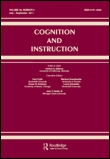
COGNITION AND INSTRUCTION
Advancing educational understanding through cognitive insights.COGNITION AND INSTRUCTION is a premier scholarly journal dedicated to advancing the understanding of cognitive processes in educational contexts. Published by Routledge Journals, Taylor & Francis Ltd, this journal plays a pivotal role in the fields of psychology and education, boasting a significant impact factor and ranking in the top quartile (Q1) across various psychological and educational categories, including Applied Psychology and Developmental and Educational Psychology. With a publication history stretching from 1984 to 2024, the journal serves as a critical resource for researchers, educators, and practitioners seeking to bridge theory and practice in teaching and learning. It provides a platform for high-quality research, focusing on the interplay between cognition and instructional practices, thereby fostering innovation in educational methodologies. Although currently not an Open Access journal, COGNITION AND INSTRUCTION ensures that cutting-edge findings and discussions are readily accessible to the global academic community, enhancing knowledge sharing and collaboration among scholars.
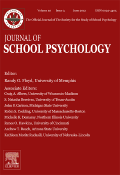
JOURNAL OF SCHOOL PSYCHOLOGY
Fostering Dialogue on Key Educational IssuesJOURNAL OF SCHOOL PSYCHOLOGY, published by PERGAMON-ELSEVIER SCIENCE LTD, is a premier journal that aligns itself at the forefront of educational and developmental psychology. With an ISSN of 0022-4405 and an E-ISSN of 1873-3506, this journal has been a significant contributor to the field since its inception in 1963. It has established itself as a leading source of research and insights, boasting a remarkable reputation with a Q1 ranking in both Developmental and Educational Psychology and Education for 2023, positioning itself within the top tier of SCOPUS indexed journals. Researchers, educators, and practitioners benefit from its rigorous studies that explore the psychological dimensions of education and student behavior, fostering an enriching dialogue on important educational issues. Although it does not currently offer open access, the journal is well-regarded, with impactful research that serves to advance academic discourse and inform best practices within the educational community. Positioned in the United Kingdom, it caters to a global audience, inviting submissions that push the boundaries of our understanding of school psychology.
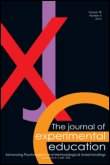
JOURNAL OF EXPERIMENTAL EDUCATION
Unveiling the complexities of learning through experimental inquiry.Journal of Experimental Education, published by Routledge Journals, Taylor & Francis Ltd, is a prestigious platform dedicated to advancing the field of educational research. With an impressive history spanning from 1932 to 2024, this journal covers significant developments in Developmental and Educational Psychology and Education, achieving a Q1 ranking in both categories for 2023. The journal is recognized for its rigorous peer-reviewed articles that explore innovative experimental methodologies and empirical studies that shape contemporary practices in education. Current Scopus rankings further establish its credibility, placing it in the top percentiles among its peers. While it is not an open-access journal, the insights offered through its publications are invaluable for researchers, educators, and students seeking to deepen their understanding of educational phenomena and improve pedagogical approaches. By fostering a community dedicated to research excellence, the Journal of Experimental Education serves as an essential resource for those committed to the advancement of education.

CONTEMPORARY EDUCATIONAL PSYCHOLOGY
Innovating Educational Practices through ResearchCONTEMPORARY EDUCATIONAL PSYCHOLOGY, published by Academic Press Inc. Elsevier Science, stands as a leading journal in the fields of developmental and educational psychology. With an impressive impact factor and ranked in the Q1 category for both Developmental and Educational Psychology and Education, it is recognized as a top resource for researchers and professionals seeking to explore the complexities of learning, development, and educational practices. The journal has been disseminating groundbreaking research since 1976 and continues to be relevant through 2024, showcasing innovative studies that inform educational theory and practice. Although the journal operates under a subscription model, it provides unparalleled insights and comprehensive reviews that cater to a diverse audience, including researchers, educators, and students. The rigorous peer-review process guarantees the high quality of published work, while its Scopus rankings affirm its significant contribution to the academic community, with standout positions in both the fields of social sciences education and developmental psychology. For those committed to advancing the intersection of psychology and education, CONTEMPORARY EDUCATIONAL PSYCHOLOGY is an indispensable scholarly resource.